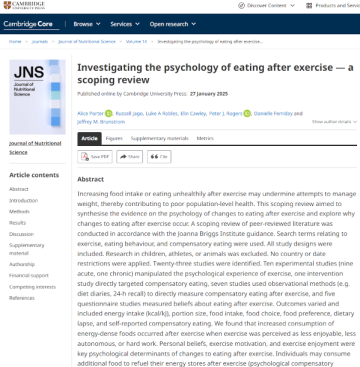Exploring the psychological factors influencing post-exercise eating
- 10 February 2025
A new scoping review has shed light on the psychological and behavioural factors influencing food intake following exercise. It has also revealed where more research on this topic is needed.
The review, published in the Journal of Nutritional Science, was led by NIHR Bristol BRC funded researchers at the University of Bristol. While the physical responses to exercise and eating are well documented, the researchers wanted to understand the evidence on how psychology plays a role.
From their analysis of 23 studies, the researchers propose two broad psychological responses to eating following exercise.
‘Post-exercise psychological compensatory eating’
This is when a person consumes more food than if they hadn’t exercised, because they believe they need to refuel their energy stores. This could be to improve their recovery and performance.
‘Post-exercise licensing’
This describes consuming more food, and particularly unhealthy, energy-dense foods, after exercise. This could be because the person has a negative psychological experience of exercise. Or it could be because they believe exercising permits them to eat unhealthy food, perhaps as a reward.
The 23 studies covered a range of study designs and measured different outcomes.
The review showed mixed findings across studies. While some of this could be because of different types of study, the researchers conclude that it is also because responses to exercise and eating vary from person to person.
The review also suggests exercise framed as burning lots of calories or fat, or as being hard work led to higher consumption of unhealthy foods.
In terms of future research, the team found limited evidence on the:
- How prevalent eating more (or less) food after exercise is
- Types of foods consumed
- Factors driving these behaviours, including how many people hold specific post-exercise eating beliefs
Dr Alice Porter, a lead researcher on the study and Senior Research Associate at the Bristol BRC, said:
“Our scoping review has helped us to understand why people might eat more than usual or unhealthily after exercise. It is now important for our future work to focus on exploring how common eating after exercise is among the general public, and whether we can reduce post-exercise eating. This may be helpful for people trying to lose or manage their weight.”
